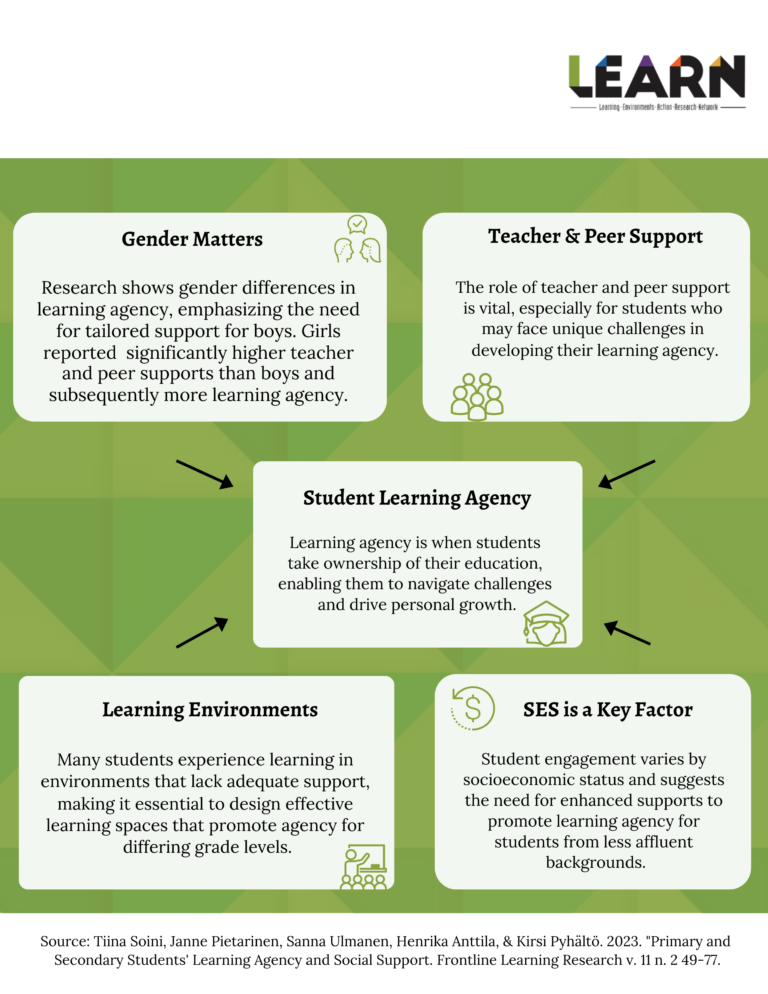Soini, T., et al. (2023). Primary and Lower Secondary Students’ Learning Agency and Social Support.
Key Takeaway: Excellent Finnish study highlighting the importance of fostering a strong sense of learning agency to support lifelong learning and active citizenship.
Criteria: Peer-reviewed article, good overview of the concept of student agency, offers insight into role of motivation, efficacy, and social context.
Authors & Title: Soini, T., et al. (2023). Primary and Lower Secondary Students’ Learning Agency and Social Support. Frontline Learning Research, 11(2), 49-77.
Resource: Link
Summary and Insights:
This Finnish study delves into the learning agency of fourth and seventh graders, emphasizing motivation, self-efficacy, and skills in problem-solving, meaning-making, and seeking help. It highlights that learning agency is a multifaceted construct involving students’ will, ability beliefs, and skills.
The researchers provide a brief overview of the literature on student agency identifying the concept of learning agency as students taking control of their educational journey by deciding what, when, and where they learn, both independently and collaboratively. This agency is not just a single skill but a combination of motivation, self-efficacy, and intentional strategies for learning. It requires students to believe in their abilities and be motivated to learn, which can be influenced by social structures and personal self-appraisals.
Learning agency includes problem-solving, meaning-making, and seeking scaffolding for learning. These elements are crucial for developing a sense of ownership over one’s education and are necessary for adapting to future challenges.
Social support from teachers and peers plays a significant role in enhancing learning agency. Teachers provide informational support through feedback and advice, which boosts students’ interest and engagement in their studies. Emotional support from teachers fosters positive attitudes towards schoolwork and can protect against stress and burnout.
Peer support can also impact learning agency, although its effects are less consistent. Positive peer attitudes towards studying can enhance engagement, while negative attitudes may lead to disengagement.
Key Insights for school leaders:
- Grade Level Differences: Fourth graders exhibited higher learning agency than seventh graders. This may be due to declining engagement as students progress through school, suggesting a need for strategies to maintain interest and motivation in older students.
- Gender Differences: Girls were more active in seeking help and making sense of learning, while boys excelled in problem-solving. This indicates different support needs for fostering learning agency among genders.
- Socioeconomic Status (SES): Students from higher SES backgrounds reported a stronger sense of learning agency. This suggests potential inequalities in learning opportunities that need addressing to ensure equitable education.
- Social Support: Peer support was more strongly linked to problem-solving, while teacher support was crucial for scaffolding learning. In lower secondary school, teacher support was particularly important for helping students construct meaning and understand learning goals.
The study underscores the importance of fostering a strong sense of student learning agency to support lifelong learning and active citizenship. For school leaders this means creating supportive environments that address diverse student needs, promote peer interaction, and provide targeted teacher support to enhance learning outcomes across different demographics. It also suggests that educational systems must strive to support learning agency for all children to ensure equality in education and society at large.
